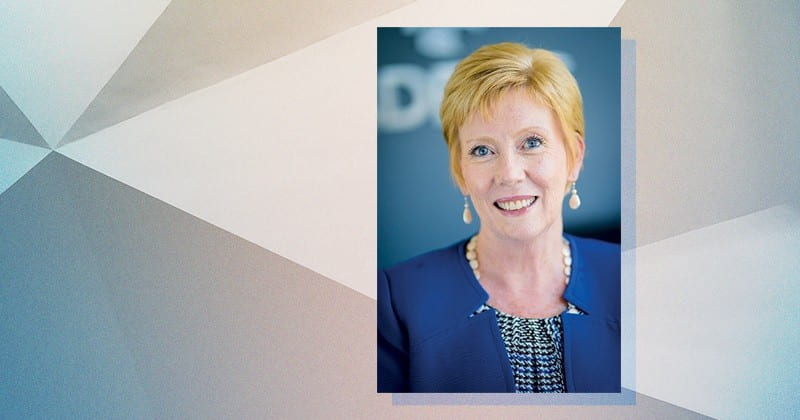Business leader Helen Stimson joins UD’s College of Engineering as an Executive-in-Residence
Helen Stimson, an experienced business leader in bioscience, was recently appointed the first-ever executive-in-residence at the University of Delaware’s College of Engineering.
“Redefining Creativity, Innovation and Entrepreneurship” is a key pillar of UD’s strategic plan, and one specific area of focus is external engagement with businesses. To this end, UD is piloting the Executive-in-Residence program, with the hopes of expanding the innovative model to additional colleges in the future.
In this pioneering role, Stimson will focus her efforts on fostering industry relationships and commercial opportunities for the college through external engagement.
Stimson shared the experiences and perspectives she has gained from industry, what first brought her to UD, and what she hopes to achieve in her new role.
Q: Tell us about your academic and professional background.
Stimson: I earned a bachelor’s in chemistry from Lafayette College, and immediately went to work in sales for Hewlett-Packard, where I utilized my chemistry training to sell analytical instruments to scientists. I had many great opportunities at HP including service manager in the New York City district, product marketing roles in instrument and software development and running HP’s European field marketing operations in Germany.
After HP spun off into Agilent Technologies, I spent the rest of my career at Agilent as the senior vice president and general manager of Agilent’s global consumables operation.
In 2017, I joined the Delaware BioScience Association as the CEO and deepened my connections in Delaware, gaining experience running a small nonprofit and advocating on behalf of the bioscience industry in Washington, D.C. I took a short-term assignment with Adesis in 2020 to help them expand and add manufacturing capabilities.
Q: How did you first connect with the University of Delaware?
Stimson: Bobby Gempesaw, the previous dean of the Lerner College, asked me if I would join their advisory council in 2014. Around that time, I also met Dawn Elliott through the Delaware BioScience Association. She was just getting started putting an advisory council together for the new biomedical engineering department, and she asked me if I would join.
In 2017, I switched my focus over to biomedical engineering, where I helped with strategy development. Then, when Dean Levi Thompson joined the University in 2018, he asked if I would come and help support the College of Engineering with the development of their strategy and join the board.
Q: What skills do you bring to this new position in COE?
Stimson: I’m a businessperson who believes diversification of revenue sources is critical to long-term success. The College of Engineering does a tremendous job securing federal funding, but just as Lerner has established mutually beneficial relationships with JPMorgan Chase and other companies, I think the College of Engineering should seek to expand its revenue sources by greater engagement with industry. This is an opportunity that I am willing to put some volunteer time and effort into helping to characterize and develop solutions for the college.
While our researchers have expertise in their fields, what I have is a lot of experience in leadership, mentoring and coaching people, selling ideas to partners, customers and management, and I have a network.
In this role, I can help our researchers understand how industry is going to look at their work and how they can better communicate their research to potential partners. In addition, there are assets that exist at the University of Delaware, like the clinics on STAR Campus or research centers and institutes, for example, that researchers don’t always think about when they talk to companies, and these are important differentiators.
Q: Why are industry partnerships important?
Stimson: Industry is a source of potential relationships that may yield financial opportunities, whether they’re philanthropic, research-related, image building or provide a superior experience for students via internships and jobs.
Q: How are you approaching your new role as COE’s Executive-In-Residence?
Stimson: I’d like to start with the individual departments that want to work with me and really begin by taking inventory: Seeing who’s on their advisory councils and how they are working with those individuals and their companies. I also like to understand which other companies they would like to work with and figure out how we can create some new targeted relationships.
Q: What excites you the most about this role?
Stimson: What excites me is being able to present the full package of the University in tandem with the research happening in the College of Engineering.
Companies can work with any university, but research institutions that have the ecosystem and infrastructure that can offer them more will be ones that companies will be more interested in. We’re trying to make sure that as we approach companies, we look to be interdisciplinary whenever we can and to present the assets of the University of Delaware beyond just the individual faculty member or departmental research view.
In addition, the College of Engineering has such an incredibly bright and talented group of people. If I can use my knowledge to help others be successful, that would be a great joy.
Article by Erica K. Brockmeier | Photo courtesy of Helen Stimson | Photo illustration by Joy Smoker | February 15, 2023

